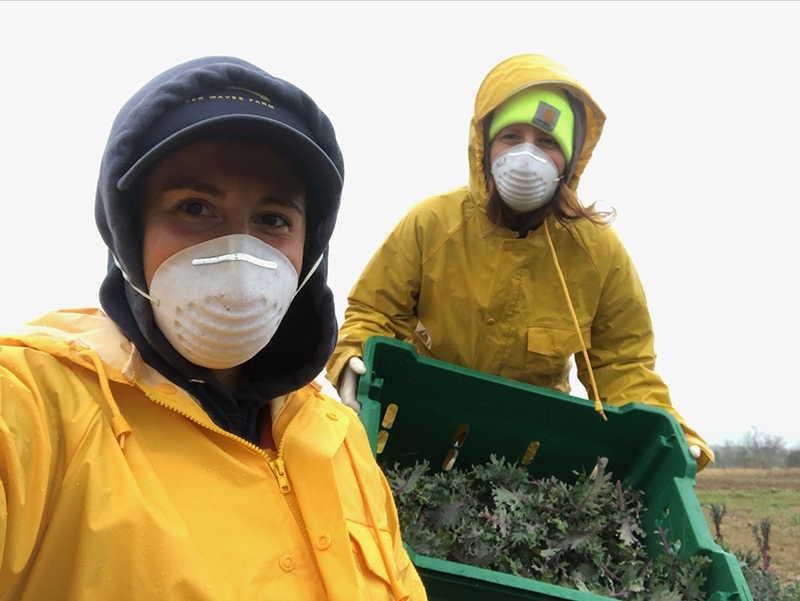
By Alexandra Talty
Across industries, the coronavirus pandemic is upending the normal. And as distribution systems struggle to catch up (hello, toilet paper), there’s been one sector hit particularly hard: agriculture.
Although food security is more important than ever, agriculture has been hit by a double whammy — restaurant and school sales disappeared overnight, while at the same time, the labor force needs to adopt new practices. And while every industry has innovated to continue their work, the cows can’t wait while farmers come up with new practices.
Luckily for those on the South Fork, many of these issues are alleviated by the abundant local food bed. Farmers on the East End are hyper-local. While this bucks the trend of industrialized agriculture, it does mean that in a pandemic, the East End is in good shape.
Except for labor. While many farms rely on a patchwork of family, longterm skilled employees and local hourly workers, many local farms are also boosted by apprenticeship programs as well as H2-A seasonal worker programs.
Located in Amagansett, both Amber Waves Farm and Quail Hill Farm rely on apprentice programs in addition to their management backbone to run the farm. Both programs provide hourly wages as well as housing if needed, in addition to teaching a new trade.
“Our farm is made up of people who are local or who have joined us from other parts of the country,” explained co-founder Amanda Merrow. Their seven employees are split into two groups — one farm field crew and one kitchen crew. They were all on Long Island before COVID-19.
However, the apprentice program was supposed to begin on April 1, but Amber Waves is having the new recruits come the last week in April instead, as they wanted to put all their safety measures in place first.
Describing it as a “constant conversation” about safety, Ms. Merrow said she feels a big responsibility for her employees. In order to keep a “closed loop,” Ms. Merrow said that all Amber Waves employees are just going between work and home. The new recruits are sheltering in place for 14 days before they arrive, in order to “create a culture of actual safety and trust,” Ms. Merrow said.
“A lot of our staff is pretty young and a lot live very far away from their families,” she said. She acknowledged that she felt a “weight of having an essential business and trying to keep your staff safe.”
At the same time however, the 34-year-old said that food production “feels like a duty” in these times. “We’re the very first-level of the supply chain,” she said.
Located less than a mile away, the beloved Quail Hill Farm is one of the oldest community farms in the country. Its apprenticeship program — Amber Waves co-founders Amanda Merrow and Katie Baldwin are graduates — has been integral to its mission. But this year, there are no new apprentices.
Quail Hill relied on the federal AmeriCorps program to place interested people at the farm for this year, something that they haven’t done since the 2000s. The handful arrived on the East End on March 11, and by March 18, they were sent back to their “homes of origin” across the United States.
“They only got one full day of work in,” said Layton Guenther, the director of Quail Hill, of this year’s recruits.
However, in some ways, the call back was a blessing for Quail Hill as six full-time employees plus nine AmeriCorp volunteers made acquiring enough PPE for everyone a monumental task, Guenther said.
Without the additional help, Guenther is giving second-year apprentices more leadership experience. The farm was able to hire a skilled farmworker from upstate New York who was laid off from her flower cultivation job following the coronavirus outbreak.
The crew has “quite a bit more experience than we usually have,” Guenther said. While, typically, the experienced workers focus on training apprentices, nowadays they are fully focused on the field.
“We are doing the apprenticeship justice by training farmers and giving second-year apprentices more leadership this season,” said Guenther, 33. “The farm really does need quite a bit more concerted effort to meet the challenges that are presented by corona,”
In order to keep their farmworkers as healthy as possible, Guenther is running a “clean team” who are in the fields, while Guenther — who prefers gender-neutral pronouns — and their partner run the curbside pick-ups for CSA members. Other local farms, including Amber Waves, are separating their workers this way, as it keeps the field workers as a closed loop.
“We are just literally putting bags of produce into their cars,” Guenther said. “We’re trying to keep it really clean and minimize contact as best we can.”
A longtime community farm, this new pickup service will likely also expand into deliveries this summer in an effort to keep members healthy. The specifics will be released soon.
For both community-based farms, how operations will run in the summertime remains a question. For now, Amber Waves is open for online orders, with pickup on Tuesday and Friday. Quail Hill’s CSA is also open for enrollment still, with pickup at the Amagansett location, as well as at Bridge Gardens in Bridgehampton. Both plan to continue following local and state health regulations while outfitting all employees with appropriate safety gear.
“Support your local farmstands … we are not Amazon.com or Peapod,” Ms. Merrow said. “We’re here doing our best to feed people. If this turns new people our way — fishing and farming is part of the heritage out here.”